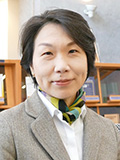YAMADA Miwa

| YAMADA Miwa |
| [Belonging・Position] | Inter-disciplinary Studies Center・Senior Research Fellow |
| [Research Field] | Business and Human Rights, Asian Law, Law and Development |
| [email] |
Miwa_Yamada 
|
| researchmap | Profile Information (Research history, education, papers & publications) |
| Japanese page |
Previous research
After working at a law firm, I joined the Institute of Developing Economies in 1998, aiming to answer the question “What roles does law play in the development of developing countries?” I have investigated the mutual relationship between institutions and the reality on the ground in examining support for developing legal systems as development assistance, non-judicial dispute resolution mechanisms in Asian countries, legal systems related to people’s movements, and the process of democratization in Myanmar. As I investigated issues related to refugees, human trafficking, and immigrant labor in the Mekong region in Thailand and conducted a series of interviews with people from Myanmar as part of my overseas research in 2008 to 2010, I realized that their labor was connected to the supply chains of Japanese companies. Also, since 2013, I have conducted research aimed at creating policy proposals on business and human rights and have prepared reports on topics such as the development of a national action plan and responsible supply chains for Japanese companies.
Current research projects
The United Nations Guiding Principles on Business and Human Rights were unanimously approved at a United Nations Human Rights Council meeting in 2011. How are the Guiding Principles, which constitute a non-binding soft law, accepted as an international framework, utilized, and embodied in policies, and how are they influencing corporate behavior? What does the existence of the Guiding Principles mean in countries and regions that have different environmental and labor standards and weak systems for protecting human rights? Have laws and regulations related to corporate activities, which are more advanced in developed countries, helped to protect the rights of people affected by corporate activities? To answer these questions, I examine global trends and local conditions in Asia and investigate how to close gaps between institutions and the reality on the ground.

